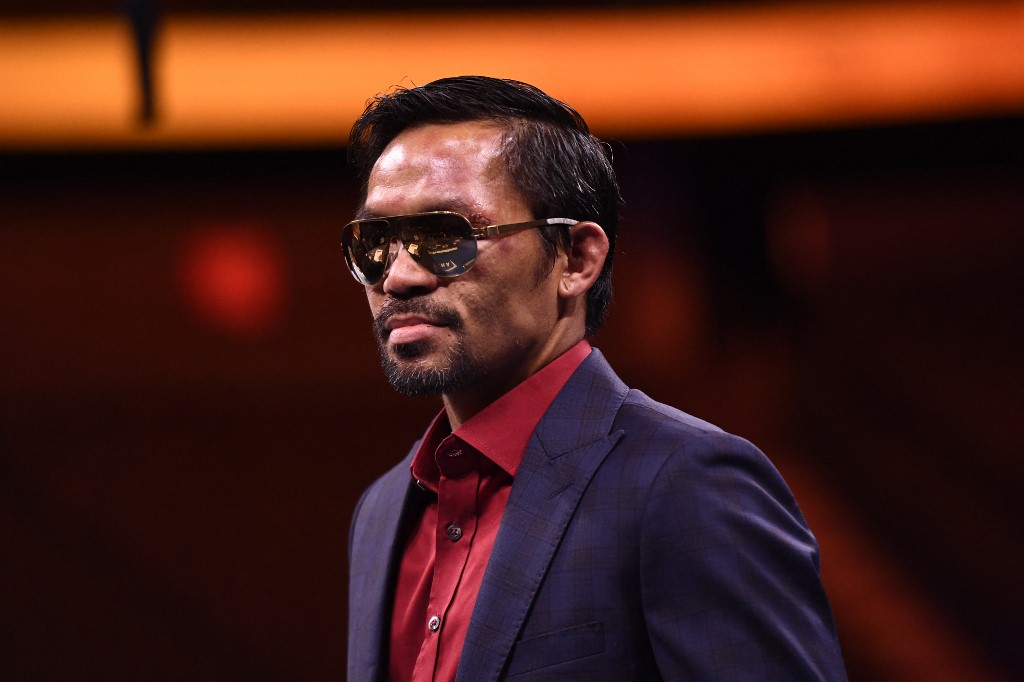
FILE – Manny Pacquiao of the Philippines speaks during a press conference after his defeat to Yordenis Ugas of Cuba in the WBA Welterweight Championship boxing match at T-Mobile Arena in Las Vegas on August 21, 2021. (Photo by Patrick T. FALLON / AFP)
Manny Pacquiao is idolized by many in the Philippines both for his punching power and rise from poverty to the peak of world boxing. But his support of a deadly war on drugs and homophobic views have drawn plenty of detractors.
Known in the Asian archipelago as “The National Fist”, Pacquiao has parlayed sporting success into the political ring, and now has his sights set on a high-stakes rumble for the presidency.
Pacquiao declared Sunday he will run for the top job in the 2022 elections, vowing to tackle poverty and corruption as he seeks to win over voters with his rags-to-riches story.
“I feel what you’re all feeling, I know the suffering that you have experienced and I know that you are all tired,” said Pacquiao after accepting the nomination of a rival faction in President Rodrigo Duterte’s ruling party.
After two terms as a congressman and one as a senator, Pacquiao’s ambition is not unrealistic in a country famed for its celebrity-obsessed politics.
But victory is far from assured.
Fans see Pacquiao, an eight-division world champion, as living proof that success is possible for anyone who works hard, no matter their origins.
But critics accuse the high-school dropout of lacking intellect and being a frequent no-show in the senate, raising questions about his ability to run the country of 110 million people.
Less than a year out from the elections, Pacquiao has risked political capital in a public stoush with Duterte, who rivals the boxer for the affections of many Filipinos and previously mentioned him as a possible successor.
He has also stirred controversy by backing Duterte’s deadly drug war, which rights groups say has killed tens of thousands of mostly poor men and sparked an investigation by the International Criminal Court.
A fervent evangelical Christian, Pacquiao has publicly opposed divorce, abortion and contraceptives, and has compared gay couples to animals — a slur that cost him a sponsorship deal with sportswear giant Nike.
“His popularity as a boxer will not 100 percent translate to his popularity as a politician,” Ted Lerner, a US-born sports journalist in the Philippines, told AFP.
Fame, power and wealth
Pacquiao dropped out of high school at 14, sold doughnuts on the roadside and became a grocery stacker to help his mother support two younger siblings.
Within a few years, the diminutive southpaw was a pro boxer.
In the ring, he is a volume power puncher who uses lightning footwork to create angles with which to deliver flurries, the likes of which have felled Oscar de la Hoya, Ricky Hatton, Miguel Cotto, Erik Morales and Marco Antonio Barrera.
But age may be catching up to him.
In what could be his last professional fight, the 42-year-old lost against Cuban Yordenis Ugas in Las Vegas last month — the eighth defeat of a glittering career spanning more than two decades.
The sport bought him fame, power, influence and wealth, and with it, the vices: booze, gambling, cockfighting and romantic links to beautiful film stars that at one point nearly wrecked his marriage.
But in 2012 Pacquiao, now a father of five, found religion and left his playboy-lifestyle behind.
Pacquiao has also served as a celebrity endorser for products ranging from appliances to pizza and cars, hosted TV shows, starred in movies and had an improbable stint as a professional basketball player and coach.
He launched a professional basketball league in 2017 and founded his own cryptocurrency, the “PAC Token”.
Known for his generosity and common touch, he has given away huge amounts of money to friends, supporters and the poor. He is known for accommodating his fans, letting them watch his training sessions.

